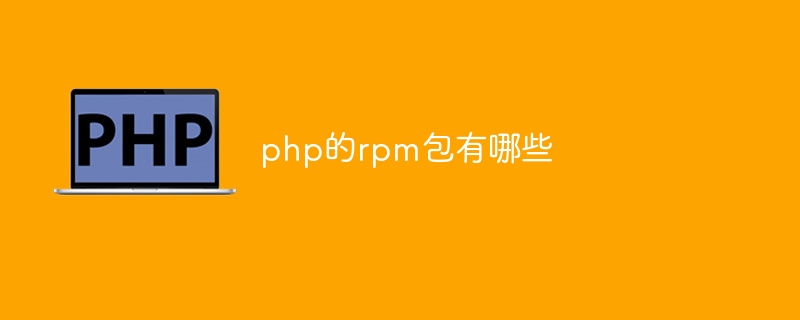What are the rpm packages of php?
Common rpm packages include php, php-cli, php-fpm, php-mysql, php-pdo, php-gd, php-xml, php-json, etc. Detailed introduction: 1. php, which is the core RPM package of PHP, including PHP’s runtime environment and basic extension modules; 2. php-cli, which is the RPM package of PHP’s command line interface, used on the command line Execute PHP scripts in; 3. php-fpm, etc.

The operating system for this tutorial: Windows 10 system, PHP8.1.3 version, Dell G3 computer.
PHP's RPM package is for installing and managing PHP software packages on Linux distributions based on RPM (Red Hat Package Manager). The following are some common PHP RPM packages:
php: This is the core RPM package of PHP, including the PHP runtime environment and basic extension modules.
php-cli: This is the RPM package of PHP's command line interface (Command Line Interface), used to execute PHP scripts on the command line.
php-fpm: This is the RPM package of PHP's FastCGI Process Manager (FastCGI Process Manager), used to handle PHP's FastCGI requests.
php-mysql: This is an RPM package integrating PHP with the MySQL database, providing the function of interacting with MySQL.
php-pdo: This is an RPM package of PHP's PDO (PHP Data Objects) extension, which is used to provide a database abstraction layer and a unified API to access multiple databases.
php-gd: This is an RPM package of PHP's GD graphics library for image processing and generation.
php-xml: This is the RPM package of PHP's XML extension, which provides the function of parsing and operating with XML documents.
php-json: This is an RPM package of PHP's JSON extension, used to process JSON data.
These RPM packages are usually provided by the official software repository of the Linux distribution and can be installed and managed using a package manager (such as yum or dnf). The specific RPM package name may vary according to different Linux distributions and versions, and can be queried and installed according to the actual situation.
The above is the detailed content of What are the rpm packages of php?. For more information, please follow other related articles on the PHP Chinese website!

Hot AI Tools

Undresser.AI Undress
AI-powered app for creating realistic nude photos

AI Clothes Remover
Online AI tool for removing clothes from photos.

Undress AI Tool
Undress images for free

Clothoff.io
AI clothes remover

AI Hentai Generator
Generate AI Hentai for free.

Hot Article

Hot Tools

Notepad++7.3.1
Easy-to-use and free code editor

SublimeText3 Chinese version
Chinese version, very easy to use

Zend Studio 13.0.1
Powerful PHP integrated development environment

Dreamweaver CS6
Visual web development tools

SublimeText3 Mac version
God-level code editing software (SublimeText3)

Hot Topics
 1376
1376
 52
52
 PHP 8.4 Installation and Upgrade guide for Ubuntu and Debian
Dec 24, 2024 pm 04:42 PM
PHP 8.4 Installation and Upgrade guide for Ubuntu and Debian
Dec 24, 2024 pm 04:42 PM
PHP 8.4 brings several new features, security improvements, and performance improvements with healthy amounts of feature deprecations and removals. This guide explains how to install PHP 8.4 or upgrade to PHP 8.4 on Ubuntu, Debian, or their derivati
 CakePHP Date and Time
Sep 10, 2024 pm 05:27 PM
CakePHP Date and Time
Sep 10, 2024 pm 05:27 PM
To work with date and time in cakephp4, we are going to make use of the available FrozenTime class.
 CakePHP File upload
Sep 10, 2024 pm 05:27 PM
CakePHP File upload
Sep 10, 2024 pm 05:27 PM
To work on file upload we are going to use the form helper. Here, is an example for file upload.
 Discuss CakePHP
Sep 10, 2024 pm 05:28 PM
Discuss CakePHP
Sep 10, 2024 pm 05:28 PM
CakePHP is an open-source framework for PHP. It is intended to make developing, deploying and maintaining applications much easier. CakePHP is based on a MVC-like architecture that is both powerful and easy to grasp. Models, Views, and Controllers gu
 CakePHP Creating Validators
Sep 10, 2024 pm 05:26 PM
CakePHP Creating Validators
Sep 10, 2024 pm 05:26 PM
Validator can be created by adding the following two lines in the controller.
 CakePHP Logging
Sep 10, 2024 pm 05:26 PM
CakePHP Logging
Sep 10, 2024 pm 05:26 PM
Logging in CakePHP is a very easy task. You just have to use one function. You can log errors, exceptions, user activities, action taken by users, for any background process like cronjob. Logging data in CakePHP is easy. The log() function is provide
 How To Set Up Visual Studio Code (VS Code) for PHP Development
Dec 20, 2024 am 11:31 AM
How To Set Up Visual Studio Code (VS Code) for PHP Development
Dec 20, 2024 am 11:31 AM
Visual Studio Code, also known as VS Code, is a free source code editor — or integrated development environment (IDE) — available for all major operating systems. With a large collection of extensions for many programming languages, VS Code can be c
 CakePHP Quick Guide
Sep 10, 2024 pm 05:27 PM
CakePHP Quick Guide
Sep 10, 2024 pm 05:27 PM
CakePHP is an open source MVC framework. It makes developing, deploying and maintaining applications much easier. CakePHP has a number of libraries to reduce the overload of most common tasks.




